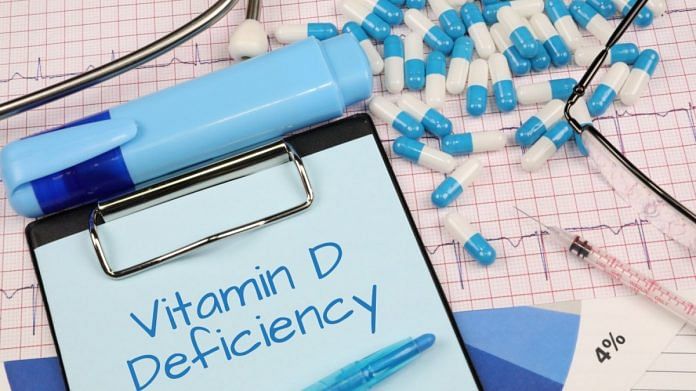New Delhi: A new study by Tata group’s online pharmacy 1mg found that about 3 out of 4 Indians suffer from vitamin D deficiency, using data spread across 27 cities and 2.2 lakh people in the country.
The study, conducted by Tata 1mg Labs, concluded that approximately 76 per cent of the population lack sufficient quantities of “the sunshine vitamin”.
Younger people (under 25 years) and men had a higher prevalence of vitamin D deficiency as compared to older participants and women.
The data from the study showed that 84 per cent of younger people suffered from Vitamin D deficiency while 81 per cent of participants (25 to 40 years) had low levels.
Additionally, 79 per cent of men were found with lower-than-desirable levels of vitamin D in their bodies, while women were not too far behind at 76 per cent.
Among the 27 Indian cities where the study was conducted, Vadodara and Surat had the highest vitamin D-deficient population in the country. In Vadodara, 89 per cent of those tested had low levels, and in Surat, this was 88 per cent.
Delhi had the lowest incidence (72 per cent), showing that all cities had numbers higher than 70 per cent.
Dr. Rajeev Sharma, vice-president, medical affairs at Tata 1mg Labs, said that “changing food habits and an indoor lifestyle with inadequate exposure to sunlight have led to a drastic increase in cases of vitamin D deficiency”.
“The much higher prevalence in young adults can also be attributed to lower consumption of vitamin D containing foods like fortified cereals and oily fish. However, seasonal variations in exposure to sunlight can also be a likely explanation, especially during winters. Unspaced and unplanned pregnancies in women with dietary deficits can lead to worsening of vitamin D status in both mother and child,” Sharma added.
Tata 1mg also highlighted the importance of getting vitamin D levels checked on a regular basis, particularly in cases of obesity, osteomalacia and TB.
“Vitamin D levels can also be checked along with regular full-body checkups, which are recommended to be done every six months or at least once a year. Infants and children under the age of five, pregnant and breastfeeding women, teenagers and young women, people over the age of 65, and those with limited sun exposure are the most vulnerable to Vitamin D deficiency,” said Dr Prashant Nag, clinical head at Tata 1mg Labs.
Vitamin D helps regulate the amount of calcium and sulphate in the body, nutrients that are needed to keep bones, teeth, and muscles healthy. It is essential for the growth, development, metabolism, immunity, bone health, and mental health of people. Its deficiency has been linked to health disorders such as prostate cancer, depression, diabetes, rheumatoid arthritis, and rickets.
The human skin hosts a type of cholesterol that functions as a precursor to vitamin D. When exposed to UV-B radiation from the sun, it turns into vitamin D. Having enough exposure to sunlight and consuming foods rich in it, such as egg yolks, oily fish, red meat, and fortified foods can help prevent the deficiency.
Also read: Indians are Vitamin D deficient. And no, it can’t be fixed by diet alone



